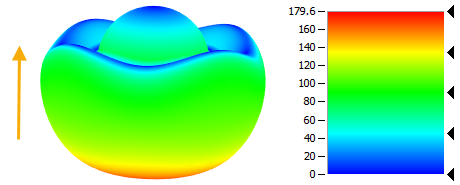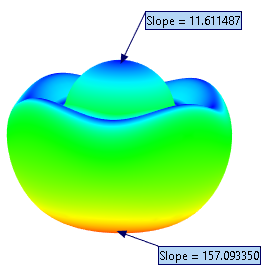Surface Deviation |
  
|
Calling the command:
Пиктограмма |
Ribbon |
|---|---|
|
Measure> Geometry Analysis > Surface Deviation |
Клавиатура |
Textual Menu |
<QD> |
Tools > Geometry Analysis > Surface Deviation |
This command allows finding deviation of the normal from the specified direction for the selected face.

The colored image of the face allows viewing the deviation over all face area. It is also possible to measure deviation at a specific point.
Upon entering the command, you need to specify the direction, with respect to which the surface deviation will be determined. You can select faces, edges, 3D profiles, workplanes, and coordinate systems as directions.
For point selections, you can use 3D nodes, vertices, edges, coordinate systems, sphere or torus faces.
The selected direction can be reversed using the ![]() option.
option.
After choosing the direction, you need to select the faces, the deviation of which needs to be calculated. They need to be specified in the Elements field.
You can select all operations in the scene using the option:
|
<A> |
Select all operations |
If the direction is specified, selected faces will change color according to the scale located on the Colors tab. Working with this tab is exactly same as in the Curve Curvature command.
To measure deviation at a specific point, use the option:
|
<C> |
Measure slope at point |
By default, if you click on a specific point on a face, a label will be created with the value of the face deviation at that point.

If necessary, the label can be omitted by deselecting the Create option in the 3D Labels tab.
In addition, the values of the coordinates of the point and the angle of inclination will be recorded in the measurement report.
Working with the Results tab is the same as in the Curve Curvature command.